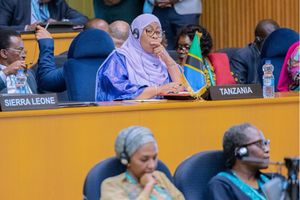It's time to celebrate our traditional instrumentalists

Tanzania is home to around 126 tribes, each with its own unique traditional instruments, rhythms and sounds that is a symbol of identity to the varied cultures.
What you need to know:
To the proponents of this nascent genre, it was a breath of fresh air that freed the airwaves of the Congolese and Western dominance on radio stations and night clubs.
The advent of Bongo Flava about two decades ago was one of the most welcome stories in the Tanzanian entertainment industry.
To the proponents of this nascent genre, it was a breath of fresh air that freed the airwaves of the Congolese and Western dominance on radio stations and night clubs.
The young men had introduced Western-inspired beats with lyrics in Kiswahili and soon celebrity status was knocking on their doors; they are our stars today!
But probably, that was the beginning of a creation of another problem, as truly local genres were to suffer untold neglect as the youth rushed for the rather westernised Bongo Flava at the expense of traditional music.
In the process, a heritage was faced with doom and today not many traditionally inspired bands command large audiences.
Tanzania is home to around 126 tribes, each with its own unique traditional instruments, rhythms and sounds that is a symbol of identity to the varied cultures.
But today, the heritage is dying out, the knowledge of how to make and play these instruments is fading because it hasn’t been passed to the next generation.
Few audiences at least in the big cities have the opportunity to appreciate their cultural heritage in the spotlight.
One such occasion periodically takes place at the Nafasi Art Space on a night christened ‘Urithi wa Leo’, an event that gears toward showcasing Tanzania’s traditional instruments, through a workshop for musicians and music students, and a live concert.
Today’s concert will be headlined by Ze Spirits Band, a highly talented group of young musicians from Bagamoyo whose star is on the rise.
Werema Masiaga Chacha and Khalfan Omary Matitu bring in their rich experience in traditional music as they play the litungu and marimba.
These respected elderly musicians who are both retired musicians and teachers at Tasuba are considered to be a symbol of Tanzanian culture.
John Kitime and Anania Ngoliga are well-known names to any music lovers in Tanzania — and at the “Urithi wa Leo” show they will be performing together as a duo, which is sure to be delightful.
Ashimba Trio and Wika Band will blend in their signature Afro-fusion style, and will feature two guest musicians from Finland.
The MuDa Africa dancers will also perform various traditional Tanzanian dances with a contemporary twist.
According to organisers, the common thread that connects these groups is that they are all committed to keeping Tanzanian tradition alive while making it interesting and welcoming to modern audiences.
Speaking to the Beat this week, John Kitime says that there was every reason for the public to embrace such shows given the state of our music.
According to him, traditional instrumentalists and musicians are faced with a huge task of handing over their expertise to the next generation at a time when everybody views music from a commercial angle. “It is a bit of a complex issue because it is a mixture of several things, at the moment patriotism has gone down and everyone is looking toward how to make that quick money,” says Kitime.
He says that the events of the last two decades have rendered traditional music less appealing and yet this is where everything started.
“Cultural things that do not bring in money is not valuable and that is why our young men are busy copying what is happening elsewhere at the expense of our own cultures,” he says.
He believes that the rich heritage that Tanzania has should work as a catalyst for the youth to prosper at international level instead of copying.
“Basata has done very little to protect traditional artistes despite having a law and that is why someone can just copy a certain traditional song without observing the associated copyright issues,” says Kitime.
He adds that when the ministry of culture was created, it was with the objective to protect Tanzanian culture but unfortunately the institutions have not grown to match the changes in the industry.
It is not a surprise that the pair of Anania and John has only performed twice in Tanzania with today’s concert being their third as opposed to the numerous times they have abroad.
Though not much is ever mentioned, one of the songs that Anania recorded with Bela Fleck, ‘Throw Down Your Soul’ went on to win two Grammy Awards in 2010.
Werema Chacha, a 60-year-old retired musician will be at hand to share his wealth of experience and he too believes the youth today have to go back to the basics.
“Let’s go back to our roots. Most of the youth today are not keen on traditional values and that is why things that are alien appeal to them more than their own ,” says Werema.
He says there is nothing with modernising our music but that doesn’t mean that we throw away our great instruments like the Litungu and the marimba only to adopt western instruments.
“It is important that they add some of these instruments in their sounds. This way they gain a unique identity that can only be found in Tanzania,” says the widely travelled musician.
He says that unless a deliberate effort is done like what they intend to do at the master class workshop today, Tanzania’s culture could be irretraceable in the near future.
“Our culture is fast eroding and it is only through these works that we can bequeath some of these skills to today’s generation,” says Werema.
Ashimba shares the views of the two musicians and he says the current crop of artistes don’t have much of a choice but to learn from them.
“We have on many occasions tried to convince these young men and women to join traditional bands but on many occasions we meet with resistance as they prefer being swayed by the market demands,” says Wika Band leader.
One of organisers ,Rebecca Corey of the Tanzania Heritage Project says though their primary focus has been the digitisation of at-risk reel-to-reel tapes, they have also been tracking down musicians and instrument makers.
“We have been doing field recordings and interviews that contribute to the preservation of the sounds, histories, and knowledge that make up Tanzania’s diverse cultural treasures,” says Rebecca Corey.
She adds: "When we visited some of these instrument makers and players outside of Dar es Salaam and heard their music and their accounts of how the knowledge and appreciation for these instruments is dying out, we decided to organise a show in Dar es Salaam that would shine a spotlight on the beauty and power of these traditions."




